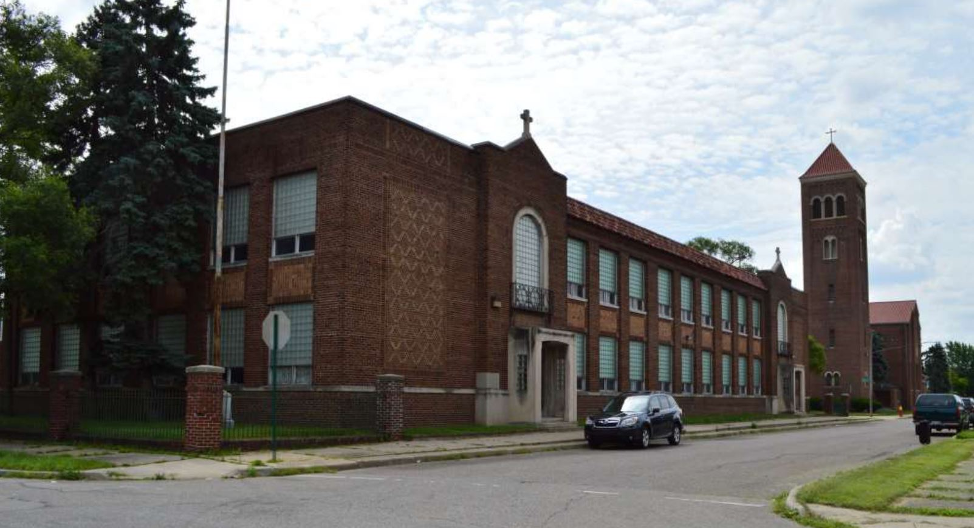Transfiguration Place Apartments will Provide 19 Affordable Homes for Detroit Residents
Mayor Mike Duggan and the Detroit Housing & Revitalization Department joined developers Ethos Development Partners and Cinnaire Solutions to kick off the $7.2 million renovation of the former Transfiguration School in the Banglatown neighborhood that will see the historic building turned into affordable housing.
The Transfiguration Place Apartments at 13300 Syracuse will feature 19 units of affordable housing, all of which will be available at 60 percent area median income (AMI) through project-based vouchers through the Detroit Housing Commission. Seventeen of the units will be one-bedroom, with the other two being two-bedrooms. The units will be unique conversions of the former classroom space into living units and feature an abundance of natural light. The project, which is located in one of Mayor Duggan’s Strategic Neighborhood Fund areas, is slated to be completed in 2022.
“Cinnaire Solutions is looking forward to partnering with the City of Detroit, Archdiocese of Detroit and Ethos Development in spurring continued growth and revitalization in the City, specifically in neighborhoods like Banglatown,” said Christopher Laurent, president of Cinnaire Solutions. “Transfiguration School is an exciting pilot project where our partnership works to restore and transform dozens of vacant or underutilized buildings into affordable housing and facilities to support key components of healthy communities.”
The City of Detroit issued an RFP for the site on behalf of the Archdiocese of Detroit as part of a partnership developed between Mayor Duggan and Archbishop Allen Vigneron. Transfiguration is a pilot project intended to assist the Archdiocese with putting dozens of its underutilized or vacant buildings back into use. Area residents were part of the RFP selection committee, and the developer held multiple community meetings during the predevelopment process to ensure their feedback would be incorporated into the building.
“This project is about the community coming together to find solutions to both our need for affordable housing and the question on what to do with the many historic but unused buildings that dot our city,” Mayor Duggan said. “I’d like to thank and congratulate the team behind the renovation of the Transfiguration School for not only their commitment to creating affordable housing but also for helping to continue the revitalization of our neighborhoods by reactivating this beautiful building that had been such an important part of Banglatown’s past.”
The two-story school building was designed by the architectural firm of Garstecki & Waier and built in 1926 to serve Detroit’s growing Polish population. The structure also served as the congregation’s church until 1950, when the adjacent church opened next door. The parish school closed in 2005, but the building was leased to a charter school until about 2014. It has sat largely unused since. The school is the oldest surviving piece of a six-building complex that was added to the National Register of Historic Places in 2019. Historic details will be preserved, and the developers will also be able to tap historic tax credits for the project because of the building’s placement on the register.
“Ethos and Cinnaire Solutions are proud to partner with the City of Detroit, Archdiocese, Detroit Housing Commission and MSHDA to bring new life to the historic Transfiguration Catholic School as affordable housing for the community,” said Joe Heaphy, president of Ethos. “Once completed, Transfiguration Place will be a model for adaptive reuse of vacant schools to turn them into assets for communities throughout the city.”
The Housing & Revitalization Department is helping the development through $1.4 million in HOME funding and $500,000 in Community Development Block Grants (CDBG). Other financial help comes through the Payment in Lieu of Taxes (PILOT) program.
“The Transfiguration Place Apartments will provide much-needed affordable housing in Banglatown and offer residents quality apartments with access to a number of amenities,” said Donald Rencher, director of HRD. “Our department is committed to ensuring that development in our city creates equity and opportunity and that our city’s neighborhoods are welcoming, inclusive places for all.”

